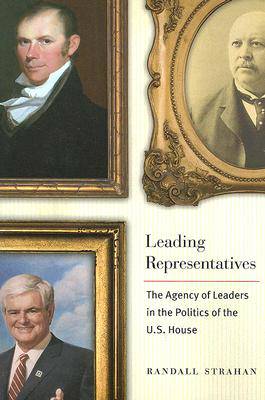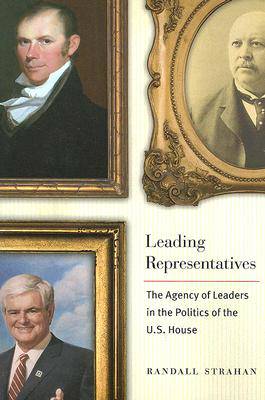
- Afhalen na 1 uur in een winkel met voorraad
- Gratis thuislevering in België vanaf € 30
- Ruim aanbod met 7 miljoen producten
- Afhalen na 1 uur in een winkel met voorraad
- Gratis thuislevering in België vanaf € 30
- Ruim aanbod met 7 miljoen producten
Omschrijving
Many studies of Congress hold that congressional leaders are "agents" of their followers, ascertaining what legislators agree on and acting to advance those issues rather than stepping to the forefront to shape national policy or the institution they lead. Randall Strahan has long argued that this approach to understanding leadership is incomplete. Here he demonstrates why and explores the independent contributions leaders make in congressional politics.
Leading Representatives is a study that draws on both historical and contemporary cases to show how leaders in the U.S. House have advanced changes inside Congress and in national policy. Exploring the tactics, tenure, and efficacy of the leadership of three of the most colorful and prominent Speakers of the House--Henry Clay, Thomas Reed, and Newt Gingrich--Strahan finds that these men, though separated in time and of differing thought and actions, were all leaders willing to take political risks to advance goals they cared about deeply. As a result, each acted independently of his followers to alter the political landscape. Strahan makes use of a wide range of resources, including the former representatives' papers and correspondence and interviews with Gingrich and his staffers, to demonstrate how these important leaders influenced policy and politics and where they ran aground.
In expounding lessons Strahan has gleaned over two decades of studying U.S. legislative politics, Leading Representatives offers a new theoretical framework--the conditional agency perspective--that effectively links contextual perspectives as applied to congressional leadership with those emphasizing characteristics of individual leaders. This engagingly written book will be of interest to political scholars of all stripes as well as readers inclined to learn more about the history and inner workings of the House.
Specificaties
Betrokkenen
- Auteur(s):
- Uitgeverij:
Inhoud
- Aantal bladzijden:
- 256
- Taal:
- Engels
- Reeks:
Eigenschappen
- Productcode (EAN):
- 9780801886911
- Verschijningsdatum:
- 1/08/2007
- Uitvoering:
- Paperback
- Formaat:
- Trade paperback (VS)
- Afmetingen:
- 186 mm x 228 mm
- Gewicht:
- 430 g

Alleen bij Standaard Boekhandel
Beoordelingen
We publiceren alleen reviews die voldoen aan de voorwaarden voor reviews. Bekijk onze voorwaarden voor reviews.











